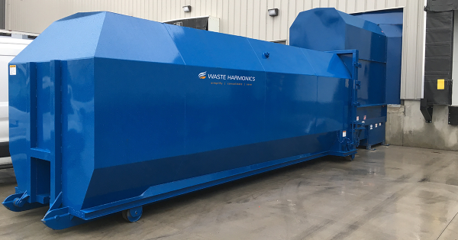Waste Harmonics CEO Talks Growth, Acquisition Strategy
Michael Hess discusses the recent Arcapita recapitalization and how technology can be leveraged to take the hassle out of waste management programs.

Waste Harmonics CEO Michael Hess got his start in the waste and recycling industry more than 30 years ago as a dispatcher for a small hauling company in Rochester, N.Y.
Throughout his career, Hess has worked in various industry capacities, including sales and operations for the hauling side of the business. But in 2001, he saw an opportunity to do something different and took a leap of faith when he purchased Waste Harmonics, a technology-enabled facility services company that delivers waste management solutions throughout North America.
Over time, Hess and his team built up Waste Harmonics to become one of the largest managed waste services companies in the U.S. The company delivers waste collection services across all 50 states, Canada, Puerto Rico and Guam through a network of more than 5,000 vendors.
Waste Harmonics operates across various business segments and has developed a platform that provides consolidated waste collection and coordination, recycling and sustainability optimization, remote equipment monitoring, smart equipment rental, compliance reporting and waste stream auditing.
Global investment firm Arcapita recently acquired a controlling interest in Waste Harmonics, which Hess says will allow the company to focus on its growth strategy over the next five years.
Hess recently sat down with Waste360 to discuss the Arcapita recapitalization, the company’s acquisition and growth strategy and how technology can be leveraged to take the hassle out of waste management programs.
Waste360: Tell us about your background and how you started Waste Harmonics.
Michael Hess: I’ve been in the waste industry for more than 30 years in various capacities. I started out as a dispatcher for a small company here in Rochester, N.Y., a number of years ago. Then, I moved into sales and operations. My final corporate gig on the hauling side of the business was with a Canadian-based outlet doing roll-off in the industry. I left them for a period of time and discovered that a piece of the business that I used to manage was for sale.
I made a few phone calls, and after a relatively short period, I was able to purchase the business in June 2001. We grew relatively slow early on, but in the last seven years or so, I refer to our growth as a bit of a rocket ride.
Waste360: What made you jump on the opportunity to purchase the company back in 2001?
Michael Hess: I was looking for my next opportunity and, quite frankly, I had never thought about purchasing, at the time, what I referred to as a brokerage business. But when I contemplated purchasing the company, I thought really hard because I had a hauling background. I thought that if I was going to take this plunge and invest some money, I wanted to make sure that I could do it differently—not only by putting our customers first but by treating our vendors and hauler partners with a high degree of respect. And that certainly has resonated within the industry and has given us the opportunity to grow this business and have a customer retention rate that I think is extremely high.
Waste360: Waste Harmonics was just acquired by global investment firm Arcapita. Can you discuss the acquisition and what it means for Waste Harmonics and your role as CEO moving forward?
Michael Hess: It’s probably more of a recapitalization than an acquisition. Back in July 2015, I brought in a private equity (PE) partner, Prospect Partners out of Chicago, a great small- to mid-market PE firm. And the timing just seemed to be right.
We hired an investment banker and went through that whole process. We have found ourselves with a new private equity partner that is excited about our business and the industry space that we’re in and, from my perspective, one that has some very deep pockets that will allow us to execute on an acquisition and growth strategy that we have over the next five years.
Waste360: Please discuss Waste Harmonics’ managed service approach to waste management and how it’s using technology to take the hassle out of waste programs for businesses across North America.
Michael Hess: We view ourselves as something very different than what the industry has viewed as that standard broker model—where brokers, in general, don’t add a whole lot of value other than, quite frankly, beating up vendors for pricing and, in some cases, creating a lot of chaos.
We view ourselves as a managed services organization. We don’t just look at creative costs; we look at overall program cost and different ways to achieve savings for our customers. We have always had a really high focus on customer service, which allows us to help our customers save some internal soft costs. That way, they can redeploy assets into other areas, so they don’t have to focus on their waste program. We also follow up on the things that their broker or national hauler isn’t following up on; we’ve been very successful with that.
Our lead into and our ability to embrace and deploy technology will continue to help us with that process. We want to make sure that we’re optimizing compactor loads. We want to make sure that our customers are not over-serviced. We want to make sure that our customers are actually receiving the services that they are paying for through service verification. If there is an issue, we can proactively reach out to our vendor partners and start the process of discovery in terms of where the failure is and how we proactively fix it, so our customers and customer locations don’t have to suffer through a backload of waste materials at their site.
Extending that a little bit further, we collect a ton of data every single day through our service requests and through our technology deployment that, in the long run, will allow us to better predict the onsite services that individual locations of customers will require.
Waste360: What are your iWaste Intelligent Container Technologies? And how do these services simplify operations for your customers?
Michael Hess: We’ve had iWaste deployed in the market since late 2012 through one of our customers. We’ve fully integrated a monitoring system into compactors since 2012. We are trying to create a richer experience and fully understand what is happening at a site and with a particular piece of equipment. It helps us not only understand the fullness of a compactor but how is it performing—what is the oil temperature? Did we have a particular problem with the machine that we needed to deploy a service technician to take care of something?

Beyond that, we’ve created our own set of independent monitors that we can plug into third-party equipment to give us many of those same readings on equipment that we don’t own. We’ve taken that same technology and deployed it into a small dumpster monitor that allows us to understand the fullness of small containers, as well as provide service verification for our customer sites.
Being able to do this in a machine-to-machine, private network that’s very secure drives a significant cost out of that technology and the monitoring that’s required every month. Because of this, we offer these iWaste technologies to our customers without any upfront capital costs and without any significant monthly monitoring fees. So, we think we’ve got a tremendous competitive advantage as we start to roll out thousands of these monitors in 2020.
Waste360: Why is utilizing a data-centric approach so important when it comes to solid waste management today?
Michael Hess: Some of this is customer driven. Our customers are demanding more and more information about what’s happening. We’ve been able to deploy technology to help us collect the data, but we’ve also been able to develop a very customizable business intelligence reporting platform for our customers. Through that platform, we can customize a set of reporting tools basically on the fly and allow customers to log in and see all the relevant data for a particular location, district, region or for their overall program.
We also can customize the data based on how they view their business. If they view their business from a transaction account perspective on a per location basis, we can produce the data back to them in that format. If they look at their data based on particular attendance, we can produce the data back to them in that format. If they want to look at their overall sustainability relative to their goals, again, it’s part of the reporting package. We push it back to them, and we have a number of customers who actually take that data and use it in their annual reports. It’s so sophisticated and flexible that we can produce almost anything they are asking for—and they’re starting to ask for a lot of data.
Waste360: What are some ways customers are leveraging the data that you’re giving back to them?
Michael Hess: It really depends on who the particular customer is. We have some customers that will take that data and use it in their annual budgeting process. So, if they do rebranding as part of their portfolio rollout, we can give them historical information relative to both pre- and post-rebranding waste volumes and what it took to get them rebranded—for instance, what materials did they divert from the waste stream as part of that rebranding process?

We have customers that generate all different types of materials—general solid waste, standardized recycling materials, hazardous waste, pallets and so on—and we can break all that data down through their entire waste stream. From the data that we’ve provided, our customers have actually changed the way they procured particular products for their business, so they can reduce the amount of waste going out of the backend of their facility.
Waste360: How is Waste Harmonics able to help companies move toward a more sustainability-focused solid waste program?
Michael Hess: We have some sustainability folks on staff here, and through our regular monthly and quarterly business reviews, we go through and understand what each one of our customer’s particular goals are. Because we have long-term relationships with our customers, we are able to better understand their business. We create a roadmap that allows us to marry our customers’ corporate goals with the reality on the street of what we can or cannot recycle and do it cost effectively.
Through our waste auditing and sustainability reporting, we can give them the information they need to find alternative sources for the way materials are brought into their business. We have been successful in helping them reduce their waste footprint.
Waste360: As someone with 30 years of experience within the solid waste management industry, how would you describe your leadership style?
Michael Hess: From my perspective, it’s really two things. I am a huge believer in empowering all our folks to make decisions. We will help them understand the impact of the decisions that they make, but we want our folks to be able to make the decisions on behalf of our customers. Because we empower them to make decisions, we find that we have a much better customer service experience than you might otherwise find. When you go into large organizations and you have a group of folks that are responsible for taking care of customers, but they don’t have any decision-making authority, it just delays what needs to be done for a customer’s site. And that delay just causes consternation and waste backup. That’s now what we’re here for; we’re here to help our customers solve problems.
I’ve always believed that if we hire the right folks, let them make those decisions. At that point, I think folks take real ownership in what they are doing and the problems that they are solving. It makes a big difference in the delivery of our service.
And what we tell our customers and what we tell our folks here is if we make a mistake, we will shoulder it. We’re not going to ask somebody else to solve that problem, and we’re not going to blame someone else. If we make a mistake, it’s our problem, we shoulder it, we resolve it. Period. End of story. No matter what industry you go into, you don’t see a ton of that, but it makes a difference. When I look at our retention rate over 19 years, I still have the customers that I bought as part of this business in 2001. It’s a testament to the things that we do and the services our folks provide.
Waste360: What are some emerging trends that you believe will impact the solid waste and recycling industry?
Michael Hess: The recycling side of our industry has been a big challenge and certainly will be for a few more years. That’s what pushes us from a sustainability perspective: How do we change things upstream so that we have less going out the backend of a particular customer location? And how do we continue to leverage the technology and the data we are gathering every day to contain the overall program costs? I think we have been pretty effective doing that, but I think that is going to continue to be a challenge for a while.
Waste360: What are some of Waste Harmonics’ goals for 2020 and beyond?
Michael Hess: We want to continue to roll out our iWaste technology in 2020 and hit our goals there. If everything goes OK, by mid-2021, we will probably have more than 15,000 devices out on the street. I would venture to bet that it would be the largest such deployment in the industry. And we will continue to execute on both our organics sales goals and then layer in some acquisition opportunities on top of that.
About the Author
You May Also Like




